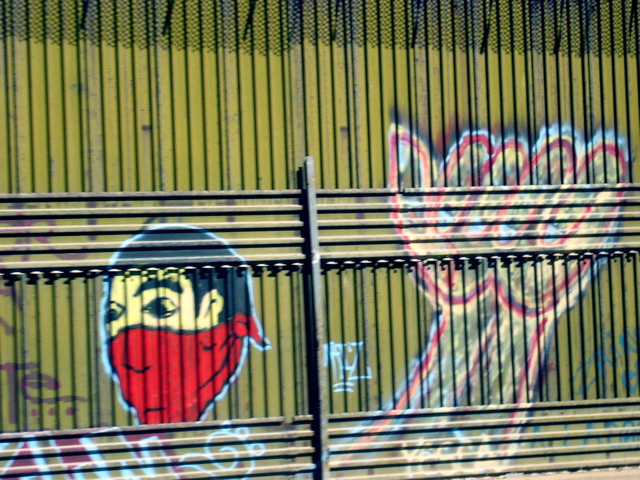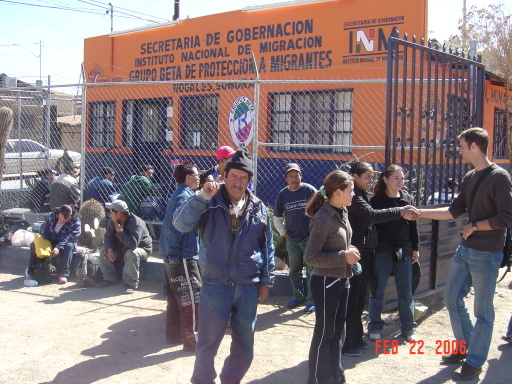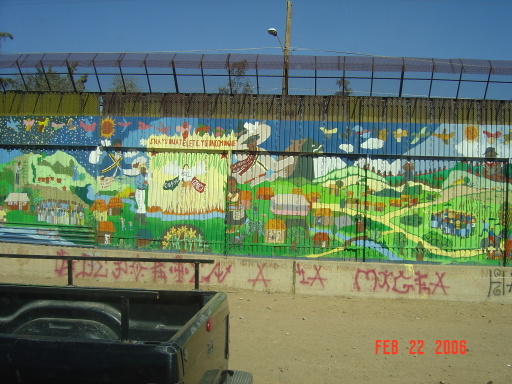|
|
||||
|
|
Border LinksI have to admit, I
specifically signed up for this class because of our class fieldtrip
to Nogales. Although I didn’t know what to expect, other than that
it was a poor little border town, I was greatly excited for the
opportunity to view this way of life.
In some ways, Nogales was tremendously impressive. Possibly, the most impressive items featured in Nogales was the way that people live in Nogales. Although there is a remarkable sense of community and solidarity, there is a tremendous disparity between the wealthy and the poor. I found this quite odd and highly disturbing. Equally off-putting, it is inconceivable to me how people can live and survive on no more than thirty dollars a week. At the house where we had lunch, Katrina, the lady that fed us, said that she also had to work for the low paying maquiladora just to have enough to take care of her kids. Both she and her husband worked at a maquiladora. This, in part, is because some work is better than no work, and she was conscious to express gratefulness for what she did have. I didn’t want to believe her when she said that she and her husband only made 60 dollars for a 100 hour work week. I couldn’t understand how they would have enough money to pay for food and clothes. The
Torres article, we are not machines, gave a particularly
disturbing account of work and pay. “I work three and a half hours
to buy a gallon of milk. My diet was a few potatoes, six eggs, a
kilo each of tortillas and beans,” this is very similar to the
families we visited in Nogales. The discussion we had with our host
family during lunch along with the trip to the store to buy basic
groceries really drove home the idea that massive sacrifices are
made just to survive. It gave me the feeling of unworthiness for
what I have been so freely given in life. A great sense of gratitude
came over me and I felt called to action on behalf of these families
and this way of life.
In our visit to Grupo Beta, a Mexican agency facilitating immigration awareness and providing shelter to the distressed, I was happily impressed to find that migrants remained determined to cross the border even after an expatriation experience with U.S. Border Patrol. En route for a better life, the immigrants we spoke to were excited to re-cross back into the United States. They were confident and hopeful of finding good-paying jobs. Their story of expatriation back into Mexico was heart wrenching. It is not easy for me to imagine all of the sacrifices that were made just to arrive at a border crossing zone. The experience of hiding from Border Patrol and huddling together for warmth in a group of family and non family alike at the age of 12 is horrifying to me. When this group of migrants was caught, they were beaten by Border Patrol and estranged from family members as they were detained and sent back to Mexico.
|
|||
|
||||



 In his
article, Arizona Ranchers Hunt Mexicans, Jose Palafox wrote
about how ranchers are taking no mercy on illegal immigrants that
cross the border on their property because immigrants trample and
trod their land. The Barrett family of ranchers describes this as
vandalization and swears to put an end to such activities. What has
brought media attention to the Barrett family is that they have
publicly bragged about the thousands of immigrants that they have
caught, sometimes at gunpoint. To think that ranchers are running
around with guns, rounding up illegal immigrants like cattle and
herding them back to get the slaughtered makes me nauseous. I find
this to be selfish entitlement exhibited by people of this mentality
to be revolting. I am puzzled by how such despicable acts can be
reconciled with themselves and how they can be in this world with
such intense hatred for a group that is just seeking a better way of
life.
In his
article, Arizona Ranchers Hunt Mexicans, Jose Palafox wrote
about how ranchers are taking no mercy on illegal immigrants that
cross the border on their property because immigrants trample and
trod their land. The Barrett family of ranchers describes this as
vandalization and swears to put an end to such activities. What has
brought media attention to the Barrett family is that they have
publicly bragged about the thousands of immigrants that they have
caught, sometimes at gunpoint. To think that ranchers are running
around with guns, rounding up illegal immigrants like cattle and
herding them back to get the slaughtered makes me nauseous. I find
this to be selfish entitlement exhibited by people of this mentality
to be revolting. I am puzzled by how such despicable acts can be
reconciled with themselves and how they can be in this world with
such intense hatred for a group that is just seeking a better way of
life.